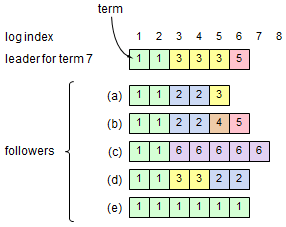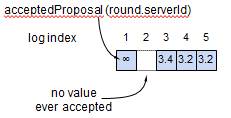Paxos Exam
-
(4 points) Each figure below shows a possible log configuration for a Multi-Paxos server (the number in each log entry gives its acceptedProposal value). Considering each log in isolation, could that log configuration occur in a proper implementation of Multi-Paxos?
-
-
(6 points) In Basic Paxos, suppose that a cluster contains 5 servers and 3 of them have accepted proposal 5.1 with value X. Once this has happened, is it possible that any server in the cluster could accept a different value Y? Explain your answer.
-
(10 points) Suppose that a server has just decided to act as leader in Multi-Paxos, and that no other servers are currently acting as leaders. Furthermore, assume that the server continues as leader for a period of time, arranging for many commands to be chosen for log entries, and that no other server attempts to act as leader during this period.
-
What is the lower bound on the number of rounds of Prepare RPCs that the server must issue during this period? Explain your answer, and be as precise as possible.
-
What is the upper bound on the number of rounds of Prepare RPCs that the server must issue during this period? Explain your answer, and be as precise as possible.
-
-
(5 points) When an acceptor is marking entries accepted using the firstUnchosenIndex provided by the proposer, it must first check the proposal number in the entries that it marks. Suppose it skipped this check: describe a scenario where the system would misbehave.
-
(5 points) Suppose that the two parts of a proposal number (round number and unique server id) were exchanged, so that the server id is in the high-order bits.
-
Would this compromise the safety of Paxos? Explain your answer briefly.
-
Would this compromise the liveness of Paxos? Explain your answer briefly.
-
-
(10 points) Suppose that a proposer executes the Basic Paxos protocol with an initial value of v1, but that it crashes at some (unknown) point during or after the execution of the protocol. Suppose that the proposer restarts and reexecutes the protocol from the beginning with the same proposal number used previously, but with a different initial value of v2. Is this safe? Explain your answer.
-
(10 points) In a successful Accept RPC the acceptor sets its minProposal to n (the proposal number in the Accept RPC). Describe a scenario where this actually changes the value of minProposal (i.e., minProposal isn't already equal to n). Describe a scenario where the system would behave incorrectly without this code.
-
(10 points) Consider a configuration change in Multi-Paxos, where the old configuration consists of servers 1, 2, and 3, and the new configuration consists of servers 3, 4, and 5. Suppose that the new configuration has been chosen for entry N in the log, and entries N through N+α (inclusive) have also been chosen. Suppose that at this point the old servers 1 and 2 are shut down because they are not part of the new configuration. Describe a problem that this could cause in the system.
Raft Exam
-
(4 points) Each figure below shows a possible log configuration for a Raft server (the contents of log entries are not shown; just their indexes and terms). Considering each log in isolation, could that log configuration occur in a proper implementation of Raft? If the answer is "no," explain why not.
-
-
(6 points) The figure below shows the state of the logs in a cluster of 5 servers (the contents of the entries are not shown). Which log entries may safely be applied to state machines? Explain your answer.

-
(10 points) Consider the figure below, which displays the logs in a cluster of 6 servers just after a new leader has just been elected for term 7 (the contents of log entries are not shown; just their indexes and terms). For each of the followers in the figure, could the given log configuration occur in a properly functioning Raft system? If yes, describe how this could happen; if no, explain why it could not happen.

-
(5 points) Suppose that a hardware or software error corrupts the nextIndex value stored by the leader for a particular follower. Could this compromise the safety of the system? Explain your answer briefly.
-
(5 points) Suppose that you implemented Raft and deployed it with all servers in the same datacenter. Now suppose that you were going to deploy the system with each server in a different datacenter, spread over the world. What changes would you need to make, if any, in the wide-area version of Raft compared to the single-datacenter version, and why?
-
(10 points) Each follower stores 3 pieces of information on its disk: its current term, its most recent vote, and all of the log entries it has accepted.
-
Suppose that the follower crashes, and when it restarts, its most recent vote has been lost. Is it safe for the follower to rejoin the cluster (assuming no modifications to the algorithm)? Explain your answer.
-
Now suppose that the follower's log is truncated during a crash, losing some of the entries at the end. Is it safe for the follower to rejoin the cluster (assuming no modifications to the algorithm)? Explain your answer.
-
-
(10 points) As described in the video, it's possible for a leader to continue operating even after other servers have decided that it crashed and elected a new leader. The new leader will have contacted a majority of the cluster and updated their terms, so the old leader will step down as soon as it communicates with any of these servers. However, in the meantime it can continue to act as leader and issue requests to followers that have not yet been contacted by the new leader; furthermore, clients may continue to send requests to the old leader. We know that the old leader cannot commit any new log entries it receives after the election has completed, since it would need to contact at least one of the servers in the electing majority to do this. But, is it possible for an old leader to execute a successful AppendEntries RPC that completes the commitment of an old log entry that was received before the election started? If so, explain how this could happen, and discuss whether or not this will cause problems for the Raft protocol. If this cannot happen, explain why.
-
(10 points) During configuration changes, if the current leader is not in Cnew, it steps down once the log entry for Cnew is committed. However, this means that there is a period of time when the leader is not part of the cluster it's leading (the current configuration entry stored on the leader is Cnew, which does not include the leader). Suppose the protocol were modified so that the leader steps down as soon as it stores Cnew in its log, if Cnew doesn't include the leader. What's the worst that could happen with this approach?







